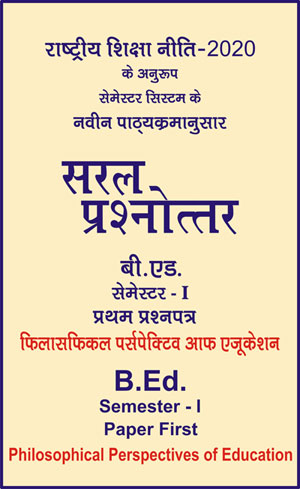|
बी एड - एम एड >> बी.एड. सेमेस्टर-1 प्रश्नपत्र-I - फिलासफिकल पर्सपेक्टिव आफ एजुकेशन बी.एड. सेमेस्टर-1 प्रश्नपत्र-I - फिलासफिकल पर्सपेक्टिव आफ एजुकेशनसरल प्रश्नोत्तर समूह
|
5 पाठक हैं |
|||||||
बी.एड. सेमेस्टर-1 प्रश्नपत्र-I - फिलासफिकल पर्सपेक्टिव आफ एजुकेशन (अंग्रेजी भाषा में)
Question- What is Philosophy of education? Explain the scope of philosophy of education.
Or
What is the significance of studying philosophy in understanding educational practices and problems?
Answer -
A Philosopher enthused by missionary zeal and wanting others to think as he does, preaches his view with the intention to convert others to his own philosophy of life. This he can achieve through education which is the best means for the propagation of a philosophy. Thus education is used as a powerful means by the philosophers who hold a vital belief to convert others into their point of view. Sir John Adams, therefore, says, "education is the dynamic side of philosophy. It is the active aspect of philosophical belief, the practical means of realizing ideals of life."
Several attempts have been made by eminent philosophers to define education from different angles. If we put together all definitions of education given by educational philosophers at different places and in different ages, we shall find that they turn into several volumes. But this does not mean that each definition is different from the other. Differences in definition do not mean the differences in real values of education.
From philosophical point of view, not all learning can be defined as education. One contemporary educationist has defined three characteristics that differentiate true education from such things as rote learning, purely mechanical training, indoctrination or brainwashing.
True education,
(i) deals with knowledge that is recognisably worthwhile and capable of achieving a voluntary and committed response from the learner,
(ii) leads to a quality of understanding that gives rise to new mental perspectives in the learner,
(iii) uses methods that encourage the exercise of judgement by the learner and the use of his critical faculties.
Scope of Philosophy of Education
Philosophy covers a large horizon of intellectual turf. The subject philosophy is divided into many different areas, including four that are particularly important in the educative process. Since these four branches are central to the educative process, they come under the scope of educational philosophy. These branches are particularly important for a classroom teacher. There are the following:
(1) Metaphysics: Metaphysics tries to Answer - the question "What is real?" Philosophers who believe spiritualism as reality consider existence and god as identical. According to them, god made a perfect spiritual world and mankind is a part of that world. Ultimate reality has been cited from the absolute mind.
Philosophers who believe in materialism consider physical existence as reality. According to these philosophers ultimate reality is vested in the physical world. Thus the metaphysical problem of philosophy is whether ultimate is in spiritual or material or physical.
(2) Epistemology: Epistemology Answer -s the question, "how to know the real or truth?" It tries to Answer - the second general philosophical question, 'How do we know?' One of the functions of teachers is to assemble knowledge and transmit that knowledge to students. Some philosophically determined beliefs about the instruments of knowledge are: (1) knowledge is gained empirically through perceptual experience (2) knowledge is gained mainly through reason (3) knowledge is gained in some instances by intuition (4) knowledge is certified by an indisputable authority.
It can be contended that knowledge is based on experience and observation. On the other hand, some knowledge is self-evident. Certain truths have long been understood and do not require proof through observation and experimentation. The other belief is that conclusive knowledge of ultimate reality is an impossibility. Agnosticism holds to this notion. Skepticism holds a questioning attitude towards the possibility of gaining knowledge. We may believe that knowledge functions in situations in which it is needed other than this teachers need to be concerned with those theories about knowledge that they can accept as part of their personal philosophies.
(3) Axiology: Axiology is a branch of philosophy that specifies the nature of values, the kinds of values and the values worth possessing. Axiology seeks to Answer - the third general philosophical question-what is value? What we need, we value. As philosophy is a quest for truth, so it is also a search for the good and the beautiful. This search for goodness and beauty leads both philosophers and educators in the axiological dimension of education. Axiology, the study of values, is subdivided into ethics, which examines morality and conduct, and aesthetics, which is concerned with beauty. In education, axiology leads to consideration of many value-oriented questions, such as - 'what is the good and beautiful life?' what does it mean to be a good human being or a good citizen?' 'what is right and wrong?'; 'are values permanent or are they changing?', are values universal or are they particular to a given time, place and culture?', 'what standards should a person use to judge a book, a musical compositional play, or other works of arts,' 'should schools reflect present cultural values or should they seek to change them?'.
(4) Logic: Logic happens to be the fourth important phase of philosophy. It seeks to Answer - the fourth general philosophical question "What is the Nature of knowledge." This phase of philosophy is closely related to both epistemology and axiology. It is related to epistemology, when one's final knowledge controls his experience. Logic is also connected with axiology, since there are values which are distinctly logical. Thus logic comes under the province of axiology. Logic is considered as a pious observation of the facts of experience.
|
|||||














